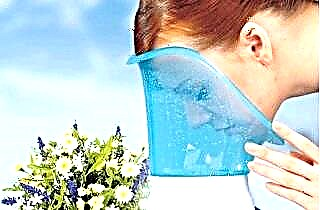Expectorant herbs can be a good alternative to pharmaceutical drugs for treating coughs. The healing power of medicinal plants has been tested by more than one generation of our ancestors. They helped to get rid of diseases in those conditions when there were no pharmacies or antibiotics. No wonder everyone treated the healers with respect. From generation to generation, knowledge has been passed on how to collect, dry and use medicinal herbs. A considerable part of this information has reached us.
Features of herbs
 Since medicinal plants do not contain chemicals that can directly affect the cough center or bronchial smooth muscles, their mechanism of action is very different from traditional pharmaceutical preparations. Although, in the end, their effectiveness sometimes turns out to be even higher, since there are no side effects.
Since medicinal plants do not contain chemicals that can directly affect the cough center or bronchial smooth muscles, their mechanism of action is very different from traditional pharmaceutical preparations. Although, in the end, their effectiveness sometimes turns out to be even higher, since there are no side effects.
Even ancient healers divided all expectorant herbs into two large groups: drying and moisturizing. After all, the purpose of their use is to rid the body of the accumulated phlegm. And this can be done in different ways. It all depends on the nature of the cough and the characteristics of the course of the disease.
The cough herb of the drying group promotes the expansion of the bronchi and blood vessels, increases sweating, reduces swelling, and removes excess moisture from the body. Such plants have a pronounced pungent or bitter taste and are used in the treatment of a wet cough with a large amount of phlegm, which is difficult to cough up.
Moisturizing plants, on the other hand, relieve attacks of dry, painful cough by thinning phlegm, moisturizing and restoring mucous membranes. They have a sweet or neutral taste, soothe sore throats and irritations, and promote quick repair of damaged mucous membranes. They translate an unproductive cough into a productive one and help cleanse the body of toxins and pus.
Application methods
There are several ways to use expectorant medicinal herbs, from which you can choose one or use several at once. The main thing is to exclude an overdose, as this can provoke allergies and other undesirable reactions.
 You can alternate between different methods using different types of plants.
You can alternate between different methods using different types of plants.
- Herbal tea. The fastest cooking method. You just need to pour a tablespoon of chopped plants (or a collection of herbs) with a glass of boiling water, let it brew for 10-15 minutes and then drink it like regular tea. Useful when drinking plenty of fluids is recommended: fever, severe sore throat, thick, viscous mucus. You can drink up to 1.5 liters of such tea per day. But it must be borne in mind that some expectorant herbs have a pronounced diuretic effect, so you need to be careful with kidney problems.
- Water tincture. It is a concentrated herbal decoction, which is then taken as a mixture - 1-2 tablespoons each (can be diluted with warm water). In the standard version of the preparation, 2-3 full tablespoons of herbs are poured with half a liter of boiling water and boiled in a steam bath or very low heat for 15 minutes. Then the mixture is poured into a thermos and infused for 2 to 12 hours (you can just leave it overnight). The strained broth is ready for use. Undiluted broth can be used to gargle, but not to drink.
- Alcohol tincture. Alcoholic herbal tinctures have a powerful antiseptic and warming effect. It can be used for compresses, rubbing and gargling (diluted with water). It takes at least 14 days to prepare an alcoholic tincture. Pour dried crushed plants into a dry, clean glass container with a well-closing lid and pour vodka or medical alcohol in a 1: 1 ratio. Close the container with a lid, shake well, put in a dark place at room temperature, shake again every 2-3 days.
 Oil tincture. An excellent remedy for soothing and moisturizing mucous membranes irritated by a dry cough. It envelops the throat, heals it and at the same time creates a protective film, eliminating perspiration and softening coughs. It is better to use herbs with antibacterial and antiseptic effect: St. John's wort, elecampane, calendula. The tincture is prepared in the same way as alcohol, but the plants are filled with vegetable oil: olive, sunflower, apricot, linseed. It should be stored in the refrigerator after it has been aged at room temperature for 14 days.
Oil tincture. An excellent remedy for soothing and moisturizing mucous membranes irritated by a dry cough. It envelops the throat, heals it and at the same time creates a protective film, eliminating perspiration and softening coughs. It is better to use herbs with antibacterial and antiseptic effect: St. John's wort, elecampane, calendula. The tincture is prepared in the same way as alcohol, but the plants are filled with vegetable oil: olive, sunflower, apricot, linseed. It should be stored in the refrigerator after it has been aged at room temperature for 14 days.- Steam inhalation. For steam inhalation, a decoction of medicinal herbs with a concentration of 2 tablespoons per 2 glasses of water is used. Boil for 5-10 minutes on low heat and you can pour it into the inhaler or just breathe over the steam, covering your head with a towel. Steam inhalation is effective for any type of cough, but with bronchial asthma, you need to be careful - some plants can provoke an attack.
To achieve a lasting effect, the same remedy should be used for at least 10-14 days.
The course of herbal treatment is slightly longer than traditional pharmaceutical preparations, even natural cough syrups. This is due to the fact that extracts or plant extracts are used in syrups, in which the concentration of the active substance is higher (sometimes several times) than in homemade broths and infusions.
Dry cough treatment
As we have already found out, for the treatment of dry cough, herbs that thin thick phlegm and relieve inflammation and pain are primarily needed. They can be used alone or formulated into an expectorant herbal collection.
It is better to prepare fees according to prescriptions or buy in pharmacies - now there are a lot of them, you can choose the one that will contain the plants you need or your favorite ones.
 Chamomile - has strong anti-inflammatory and antiseptic properties.
Chamomile - has strong anti-inflammatory and antiseptic properties.- Mint - quickly soothes even a strong cough, makes breathing easier, increases bronchial secretion.
- Mother-and-stepmother - helps to cough up phlegm faster by stimulating the receptors of the gastric mucosa and, thus, provoking a cough.
- Melissa is an excellent sedative, in a concentrated form it gives a mild sedative effect, it will help you fall asleep without coughing.
- Elecampane - can be considered a complex drug: it strengthens the immune system, dilutes and removes phlegm, has an anti-inflammatory effect.
- Licorice root is an excellent expectorant ability, while its pronounced antiviral properties make it literally indispensable in the treatment of acute respiratory infections, acute respiratory viral infections and colds.
- Oregano - has anti-inflammatory, expectorant and antibacterial properties, it is great for all types of bronchitis and even pneumonia.
You can use ready-made syrups and potions based on these plants. For example, Mukaltin tablets are a completely natural preparation that consists of crushed compressed herbs. It costs a penny, and the strength of the impact is such that he gave the name to a whole group of drugs: "mucolytic"!
Wet cough treatment
Herbs are good for treating wet coughs to increase the amount of phlegm and to cough it up effectively. And the list in this category opens from childhood to all the familiar root of marshmallow, from which pharmacists prepare the sweetish mixture "Alteyka". But if you are not too lazy to mess around, then you can brew it at home.
 Other herbs are useful for wet coughs:
Other herbs are useful for wet coughs:
- Anise - Anise seeds have a characteristic flavor and are rich in essential oils, which soften the mucous membranes; anise drops are added to milk or to a sugar cube.
- Elderberry - Elderberry flowers have an excellent anti-inflammatory effect, soothes the throat, helps to get rid of mucus.
- Calendula - a diluted alcoholic tincture is more often used for rinsing, has an antibacterial and anti-inflammatory effect.
- Plantain - the leaves of this plant have powerful antiseptic and wound-healing properties, they well restore damaged mucous membranes.
- Caraway - a decoction of the plant's seeds is used, mainly in combination with other herbs due to its spicy taste, expectorant and anti-inflammatory properties.
- Violet tricolor - few people know that this plant helps even with an allergic cough, relieves swelling, and has expectorant properties.
- Thyme - enhances the activity of the ciliated cilia of the bronchi, has an anti-inflammatory effect, and softens cough well.
There are also versatile plants that are good for any type of cough. These are St. John's wort, celandine, eucalyptus and almost all conifers: cedar, pine, fir. They are best used in the form of inhalation or for rinsing; it is not recommended to drink concentrated decoctions and tinctures of these plants.
Contraindications and precautions
An absolute contraindication to herbal treatment is their individual intolerance. For some plants, it is not so rare, therefore, it is recommended to start taking herbs with small doses, which are gradually increased. At the first manifestations of allergy, the use of this plant in any form will have to be abandoned.
 Many plants cannot be used during pregnancy, especially in the first trimester - with a strong vasodilating or diuretic effect, they can provoke a miscarriage. When breastfeeding, there are fewer restrictions, since the concentration of herbs is insufficient to affect the baby. But they can spoil the taste of milk, and the child will simply refuse it.
Many plants cannot be used during pregnancy, especially in the first trimester - with a strong vasodilating or diuretic effect, they can provoke a miscarriage. When breastfeeding, there are fewer restrictions, since the concentration of herbs is insufficient to affect the baby. But they can spoil the taste of milk, and the child will simply refuse it.
If you are not only treated with herbs, but also take traditional medicines prescribed by your doctor, be sure to ask the question of how compatible they are. Some plants can significantly reduce the effectiveness of antibiotics, as they accelerate their elimination from the body.
The minimum course of treatment is 10-14 days, but expectorant herbs cannot be drunk for longer than 2 months.
In order for them not to lose their effectiveness, it is necessary to take a break, the duration of which is equal to the duration of the course of treatment. Moreover, a break does not mean replacing some herbs with others. If necessary, you will have to use other methods of treatment, and it is better not to get sick at all.

 Oil tincture. An excellent remedy for soothing and moisturizing mucous membranes irritated by a dry cough. It envelops the throat, heals it and at the same time creates a protective film, eliminating perspiration and softening coughs. It is better to use herbs with antibacterial and antiseptic effect: St. John's wort, elecampane, calendula. The tincture is prepared in the same way as alcohol, but the plants are filled with vegetable oil: olive, sunflower, apricot, linseed. It should be stored in the refrigerator after it has been aged at room temperature for 14 days.
Oil tincture. An excellent remedy for soothing and moisturizing mucous membranes irritated by a dry cough. It envelops the throat, heals it and at the same time creates a protective film, eliminating perspiration and softening coughs. It is better to use herbs with antibacterial and antiseptic effect: St. John's wort, elecampane, calendula. The tincture is prepared in the same way as alcohol, but the plants are filled with vegetable oil: olive, sunflower, apricot, linseed. It should be stored in the refrigerator after it has been aged at room temperature for 14 days. Chamomile - has strong anti-inflammatory and antiseptic properties.
Chamomile - has strong anti-inflammatory and antiseptic properties.

